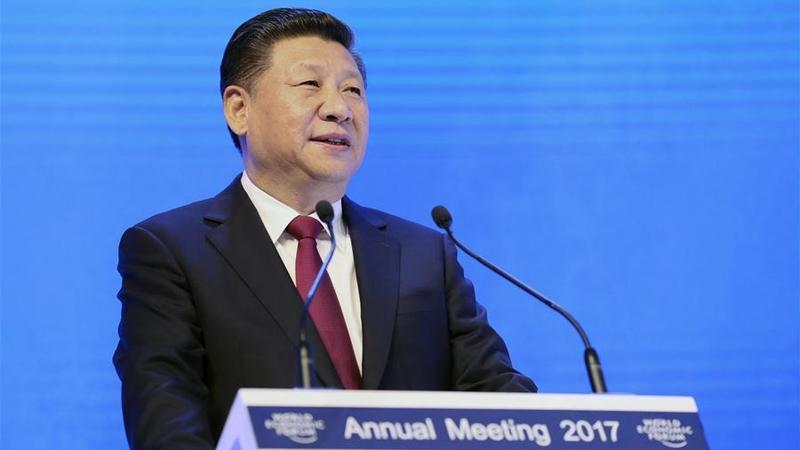Media Report

- CNBC reports: "President Xi Jinping wasn't present at this year's World Economic Forum meeting in Davos, Switzerland, but the impact of his speech championing globalization at last year's gathering lingered. Xi's right hand man, Liu He, took to the stage in the snow-capped Swiss town to reiterate claims about China's commitment to opening up further. Chinese business executives in attendance, such as Alibaba founder Jack Ma, also sang praises for trade and globalization. 'Such calls for globalism by China would have been unthinkable only 10 or 15 years ago, when Chinese firms were just beginning to explore the global marketplace,' an opinion piece by Chinese media outlet Caixin Global said. Even as the world's second-largest economy has emerged as an advocate for free trade, China's vision for a globalized order is actually 'much more narrow' than what the world is currently used to, according to Tom Rafferty, regional manager for China at the Economist Intelligence Unit. It's all part of an ideology that Caixin deemed 'globalism with Chinese characteristics,' and Rafferty said it means the Chinese government still wants significant control over what crosses its borders."
- Quartz reports: "In 2013, Chinese president Xi Jinping proposed the Belt and Road Initiative (BRI), an ambitious infrastructure-building project covering much of Eurasia, various seas, and parts of Africa. At the time, few considered how the Arctic might fit into Beijing's plans. Now, that issue has come more into focus. Today a Chinese government agency released 'China's Arctic Policy,' a white paper outlining how the BRI applies to the Arctic. According to the paper, China will encourage its developers to build infrastructure along Arctic routes, and urge its shipping companies to conduct trial voyages through the sea. Shipping routes will expand in number, and along them China will facilitate economic and social progress. The paper emphasizes that China has 'shared interests' with Arctic nations."
- The Economist comments: "'I've never seen Beijing like this,' said Emmanuel Macron, the French president, beneath an unaccustomed cerulean sky at the end of a recent visit. The next day Greenpeace East Asia, an NGO, showed that his impression was accurate. It found that concentrations of PM 2.5—the smallest polluting particles, which pose the greatest health risks—were 54% lower in the Chinese capital during the fourth quarter of 2017 than during the same period of 2016... How has it done it and at what cost? The country has had draconian anti-pollution measures since 2013, when it introduced a set of prohibitions called the national action plan on air pollution. This imposed a nationwide cap on coal use, divided up among provinces, so that Beijing (for instance) had to reduce its coal consumption by 50% between 2013 and 2018. The plan banned new coal-burning capacity (though plants already in the works were allowed) and sped up the use of filters and scrubbers. These measures cut PM-2.5 levels in Beijing by more than a quarter between 2012-13, the time of the city's notorious 'airpocalypse', and 2016. The measures were notable for being outright bans on polluting activities, rather than incentives to clean up production, such as prices or taxes... The drop in pollution in late 2017 exemplifies why bans in China often work better than elsewhere. First, many of the biggest polluters are state-owned, and so are more easily controlled. And second, with more than half of China's pollution coming from coal-fired power stations, the government can concentrate on coal and do more than regimes in places where the causes of pollution are more varied."
Calendar
- 2018-01-25 U.S. imposes more North Korea sanctions; urges China, Russia expulsions
- 2018-01-24 What could China do in a US trade war?
- 2018-01-23 U.S. Tariffs, Aimed at China and South Korea, to Hit Targets Worldwide
- 2018-01-22 Trump’s moment of truth on China has arrived
- 2018-01-21 China's breathtaking transformation into a scientific superpower
- 2018-01-19 Trump's defense strategy sees China and Russia as biggest threats
- 2018-01-18 China's Economy Growth Look Strong. Maybe Too Strong.
- 2018-01-17 Ex-C.I.A. Officer Suspected of Compromising Chinese Informants Is Arrested
- 2018-01-16 China fake data mask economic rebound
- 2018-01-15 US Plans New Nuclear Weapons
News
- CNBC 'Globalism with Chinese characteristics' is on display in Davos. But it's not everything it seems
- Quartz China wants to build a 'Polar Silk Road' in the Arctic
- Reuters China envoy says "complex" reasons why has not been to North Korea
- Business Insider China's bitcoin crackdown has simply driven trade underground
- Chicago Tribune Apple vs. Ivanka Trump: Competing ethics collide in China
- The Diplomat US-China Trade Tensions Worsen
- CNN North Korea sanctions are strangling this Chinese city
- The New York Times Davos Lauds China's Climate Efforts Even as Emissions Rise
- BBC News China's eight-year-long smartphone growth comes to an end
- CNBC It's profit over politics at China's state-run rail giant, chairman says
- Quartz Even China's cloned monkeys have a political message for the world
- Reuters China's development push in poor countries worries non-profits
- Quartz The clickbait kings of China and the US are joining forces
Commentary
- Economist How China cut its air pollution
- National Interest The Army's New Self-Propelled Howitzer Is Aimed at China and Russia
- China Law Blog Gaming the System? Foreign Access to China's Online Gaming Industry
- War On The Rocks Australia Is Not On The Fence Between America and China
- The New York Times China Embraces a Game About a Traveling Frog
- Forbes After Bike Sharing Explodes In China, Local Authorities Now Move To Clamp Down
- Forbes China Wins Its Fight Over Flights With Rival Taiwan